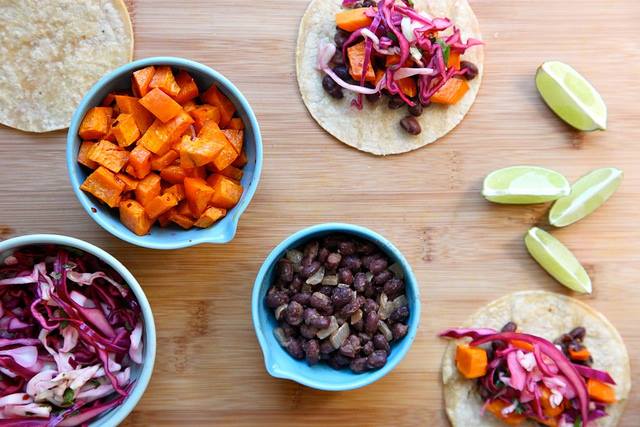By Sarah Frazer || Staff Writer

This past Wednesday, March 1, F&M’s Center for the Sustainable Environment hosted another Sustainable Food Workshop, as part of a series of events aimed at teaching students how they can eat and buy more sustainably. The Center has been bringing cooking to people on campus to show students that living sustainably is not that complicated and to give them some helpful tips.
In this week’s workshop, students took a break from studying to learn how to make eco-friendly sweet potato and black bean tacos. At the beginning of the workshop, first year, E Marcovi, gave an introduction and then explained how the tacos would be made. Every student was given a task to cut veggies or to prepare other ingredients. Making the taco fillings did not take very long, and, pretty soon, it was time for everyone to assemble their tacos. The tacos were healthy, and everyone seemed to enjoy them.
The recipe to make the tacos is pretty simple:
2 sweet potatoes (peeled and cut into small cubes)
4-5 tsp olive oil
Salt and red chili flakes to taste
Juice of 4 limes
2 heaping cups of cabbage (purple or green or both)
½ c finely diced yellow onion
2 tbsp chopped cilantro
1 (15 oz) can of black beans, drained and rinsed
Small corn tortillas
Preheat the oven to 400 degrees F and coat the diced sweet potatoes with 3-4 tsp olive oil, salt, red chili flakes, and juice of 1 lime. Bake in the oven for 40 minutes, tossing the potato chunks around a few times while cooking to cook evenly. Next make a cabbage slaw in a medium bowl. Chop the cabbage, ¼ of the onion, and the cilantro into the bowl. Add juice of 2 limes, salt, and chili flakes. Mix and let sit. For the beans, add 1 tsp olive oil and ¼ of an onion to a pan. Let that cook for about 3 minutes; then add cumin, the beans, and juice of 1 lime. Cook until heated through. Put all the ingredients together on a tortilla, and you have a delicious, healthy meal.
These tacos are 100% plant based or vegan, meaning they contain no animal products. The reasons plant based food is better for the environment are two fold: meat and dairy products use more resources to produce and their production results in a greater output of greenhouse gases and pollution than does plant based food.
That meat and dairy production requires more resources seems intuitive: the nutrients from the plants are consumed by an animal which is then eaten by a human. Contrast this process to a human eating plants, and you have one less step involved. Indeed, the research proves this theory: it take 460 gallons of water to produce ¼ lb of beef; 500 gallons per pound of chicken; 100 gallons per pound of potatoes; and 110-250 gallons for a pound of wheat. This information comes from the U.S. Geological Survey’s Water Science School, and the numbers remain consistent with various types of meat and plant products.
Not only do animal products require more water usage to produce than plant based products do, the meat and dairy industry also generates tons of greenhouse gas emissions and pollution. Meat production causes methane, from cow farts among other sources, to be emitted into the atmosphere. This gas is significantly more potent than CO2, so its emission are concerning for anyone worried about the effects of global climate change. The production of meat and dairy products also pumps pollution into the air and water surrounding large factory farms. This pollution can result in “environmental and human health risks such as water quality impairment, fish kills, algal blooms, contamination of drinking water sources, and transmission of disease-causing bacteria and parasites associated with food and waterborne diseases,” according to the EPA. Moreover, meat production causes deforestation, as it requires much more land for cattle grazing and the production of cattle feed, than it would if that land was used for plant based food production. Deforestation leads to more greenhouse gases in the atmosphere, which, of course, leads to more climate change.
These statistics do not take into account all the other harmful ecological effects of meat consumption. For instance, too many fish are currently being taken out of the oceans. This widely reported overfishing has led to scarcity of some kinds of fish. According to National Geographic, “if fishing rates continue apace, all the world’s fisheries will have collapsed by the year 2048.”
As is evident, consuming more plant based products and less animal products is better for the environment. At the same time, not all animal products are created equally. It would be better to eat chicken or pork than beef, for instance. It is important to remember that every lit bit helps, so you don’t have to go totally vegan or vegetarian to eat more sustainably. Try meatless mondays, eating Vegan Before Six, about which Mark Bittman has written a book, or choosing vegan options at restaurants when they are offered, like soy milk instead of dairy or a veggie burger instead of beef. Changing something is better than nothing, and nothing is becoming increasingly unsustainable. Plus, plant based food is healthy and does not cause harm to animals.
If you are interested in getting more information, eating more plant based foods, or even going fully vegan, there are many resources online. A documentary on Netflix that Marcovi highly recommends is Food Choices, which is about 90 minutes long. More and more studies and news articles have been coming out about the impacts of industrial animal agriculture, including the animal cruelty associated with it. And F&M’s Center for the Sustainable Environment will be hosting more workshops with tips, so look out for those.
Sophomore Sarah Frazer is a staff writer. Her email is sfrazer@fandm.edu.